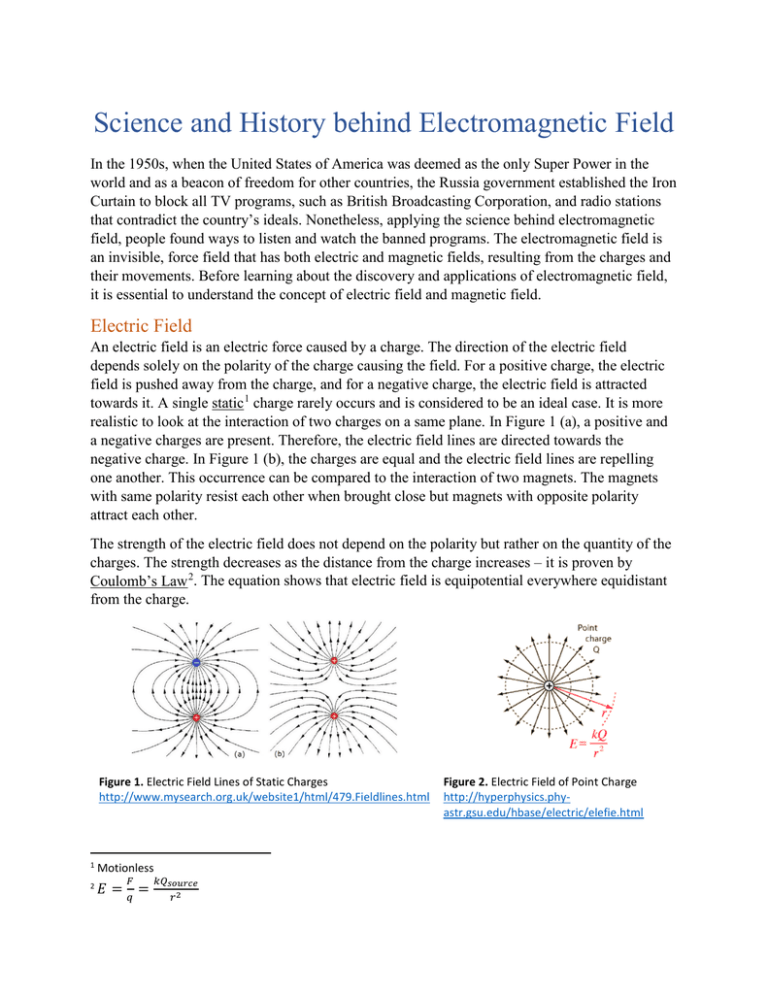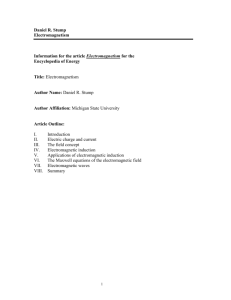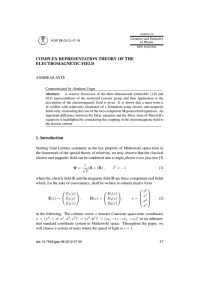Science and History behind Electromagnetic Field
advertisement

Science and History behind Electromagnetic Field In the 1950s, when the United States of America was deemed as the only Super Power in the world and as a beacon of freedom for other countries, the Russia government established the Iron Curtain to block all TV programs, such as British Broadcasting Corporation, and radio stations that contradict the country’s ideals. Nonetheless, applying the science behind electromagnetic field, people found ways to listen and watch the banned programs. The electromagnetic field is an invisible, force field that has both electric and magnetic fields, resulting from the charges and their movements. Before learning about the discovery and applications of electromagnetic field, it is essential to understand the concept of electric field and magnetic field. Electric Field An electric field is an electric force caused by a charge. The direction of the electric field depends solely on the polarity of the charge causing the field. For a positive charge, the electric field is pushed away from the charge, and for a negative charge, the electric field is attracted towards it. A single static 1 charge rarely occurs and is considered to be an ideal case. It is more realistic to look at the interaction of two charges on a same plane. In Figure 1 (a), a positive and a negative charges are present. Therefore, the electric field lines are directed towards the negative charge. In Figure 1 (b), the charges are equal and the electric field lines are repelling one another. This occurrence can be compared to the interaction of two magnets. The magnets with same polarity resist each other when brought close but magnets with opposite polarity attract each other. The strength of the electric field does not depend on the polarity but rather on the quantity of the charges. The strength decreases as the distance from the charge increases – it is proven by Coulomb’s Law 2. The equation shows that electric field is equipotential everywhere equidistant from the charge. Figure 1. Electric Field Lines of Static Charges http://www.mysearch.org.uk/website1/html/479.Fieldlines.html 1 Motionless 2 𝐸𝐸 = 𝑞𝑞 = 𝐹𝐹 𝑘𝑘𝑄𝑄𝑠𝑠𝑠𝑠𝑠𝑠𝑠𝑠𝑠𝑠𝑠𝑠 𝑟𝑟 2 Figure 2. Electric Field of Point Charge http://hyperphysics.phyastr.gsu.edu/hbase/electric/elefie.html Magnetic Field A magnetic field is a force field caused by the movement of a charge, defined as a current. The magnitude of magnetic field decreases as the distance from the power source increases. The direction of the magnetic field, unlike that of electric field, is determined using the Right Hand Rule, also known has RHR. The first picture on Figure 3 shows an example of the right hand rule. The thumb is pointed in the direction of the current and the other four fingers are curled in the direction of the magnetic field. The RHR can also be applied in the opposite manner – thumb in the direction of the magnetic field and the current in the direction of the four fingers. Figure 3. Magnetic Field Lines of a Bar Magnet Image from http://hyperphysics.phy-astr.gsu.edu/hbase/magnetic/magfie.html History of Electromagnetic Field It was in 1864 when the interrelationship between electric field and magnetic field was presented by James Clerk Maxwell to the Royal Society of London. Before his publication, electric field and magnetic field were considered as two distinctive entities. It was Maxwell himself who combined Ampere’s Law, Faraday’s Law, and Gauss’s Law, and described the electromagnetic field as a form of wave. Ampere’s Law states that the magnetic field induced 3 by the current is directly proportional to the magnitude of the current and the length of the current-carrying object or conductor. Faraday’s Law, which is essential for inductors, demonstrates the relationship between the voltage and magnetic field. Any changes to the magnetic field in a closed loop or surface will cause a voltage drop or increase. Gauss’s Law is the last two equations of Maxwell’s equations. The first equation is for electric field and it proves that the electric flux 4 within a closed surface is equal to the total charge enclose. The second equation is for magnetic field and it states that there is no magnetic flux outside of the closed surface or loop. Maxwell first came to his theory when he recognized the relation between the speed of light and the speed of electric and magnetic fields in different dielectrics 5. Using the relation and the 3 Generated Product of a field and the area the field encounters 5 Poor conductors of electricity 4 equations from Figure 4 as the basis, Maxwell continued his research and came to the conclusion that the electric field never exists without the magnetic field and the fields exist in wave form. In addition, he declared that the change in the electric field causes a change in the magnetic field and vice versa. While Maxwell’s equations were theories at first, it was later proven correct by Heinrich Hertz, who demonstrated Maxwell’s theories by showing the existence of radio waves and their speed. Figure 4. Maxwell’s Equations Image from http://www.thunderbolts.info/eg_draft/eg_appendix_3.htm Applications We constantly encounter technology that use electromagnetic fields. Some of the instruments include: • • • • • • Cell phone Microwave Clothes washer Hair dryer LCD/plasma TV Lightbulb A cell phone is one of the most widely used devices that depend on electromagnetic fields. It is composed of circuits and charged using electricity. Using the definition of magnetic field, it becomes apparent that a cell phone produces electromagnetic field, using the electricity from the battery. In order to have access to 3G and wifi, the cell phone, using an antenna, receives electromagnetic fields in wave form from outside sources. A microwave is an underappreciated instrument that utilizes the amplification of electromagnetic waves to heat, thaw, and cook food. Inside a microwave, electromagnetic waves are produced from all sides and is applied to the food placed on the rotating plate. Most microwaves are designed in such a way that all the electromagnetic fields are concentrated at the center, causing the central part of the food to be warmer than the rest.

